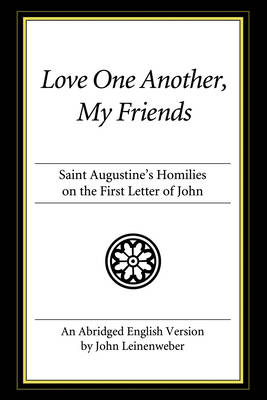
- Afhalen na 1 uur in een winkel met voorraad
- Gratis thuislevering in België vanaf € 30
- Ruim aanbod met 7 miljoen producten
- Afhalen na 1 uur in een winkel met voorraad
- Gratis thuislevering in België vanaf € 30
- Ruim aanbod met 7 miljoen producten
Zoeken
Love One Another, My Friends
St. Augustine's Homilies on the First Letter of John
Saint Augustine of Hippo
Paperback | Engels
€ 29,45
+ 58 punten
Omschrijving
Augustine's interpretation is spiritual--his were not scholarly or academic concerns--and John Leinenweber's translation is fresh and accessible, capturing the clarity, brilliance, and inspired passion of the original. John has said many things, stated Augustine, and almost all of them concern love. The first six of the ten homilies were delivered on the days of the Easter octave. This period proved too short for Augustine to cover the whole of the letter, and he preached four additional homilies later in the spring. In his Confessions, Augustine spoke of his great longing as a youth to love and be loved--a topic that appealed greatly to his listeners. During the course of delivering these homilies, he was interrupted time and again by applause and shouts of enthusiasm. The ten homilies are broken up into twenty-four short chapters, for example: The Commandment of Love, Two Loves (of God and of the World), Christ and Antichrists, Unanswered Prayer, God is Love, God Has Loved Us First, Love Casts Out Fear. His are in large part moral teachings, dealing with such topics as prayer, our enemies, fear of God, the church, the world (so important in Saint John's writings). What does one actually do to love God and others? What are the pitfalls of loving? How can one learn to love more? Throughout the homilies, Augustine's great desire to love and be loved and to live eternally with God are eloquently expressed. Believing himself ignorant of Scripture, he had initially considered himself ill-prepared for the priesthood. Augustine's subsequent tireless studies unleashed a stream of biblical commentaries that led him to be ranked with Thomas Aquinas as one of the greatest teachers the Western Church has ever produced, and one of its greatest Fathers. His towering intellect molded the thought of Western Christianity, and his ideas dominated the thinking of the Western world for a thousand years after his death. Augustine wrote profusely, explaining and defending the faith. Called Doctor of Grace, his best known works are his Confessions, one of the greatest spiritual classics of all time, and City of God, an exposition of a Christian philosophy of history.
Specificaties
Betrokkenen
- Auteur(s):
- Uitgeverij:
Inhoud
- Aantal bladzijden:
- 127
- Taal:
- Engels
Eigenschappen
- Productcode (EAN):
- 9781606083864
- Verschijningsdatum:
- 2/01/2009
- Uitvoering:
- Paperback
- Formaat:
- Trade paperback (VS)
- Afmetingen:
- 137 mm x 208 mm
- Gewicht:
- 158 g

Alleen bij Standaard Boekhandel
+ 58 punten op je klantenkaart van Standaard Boekhandel
Beoordelingen
We publiceren alleen reviews die voldoen aan de voorwaarden voor reviews. Bekijk onze voorwaarden voor reviews.








